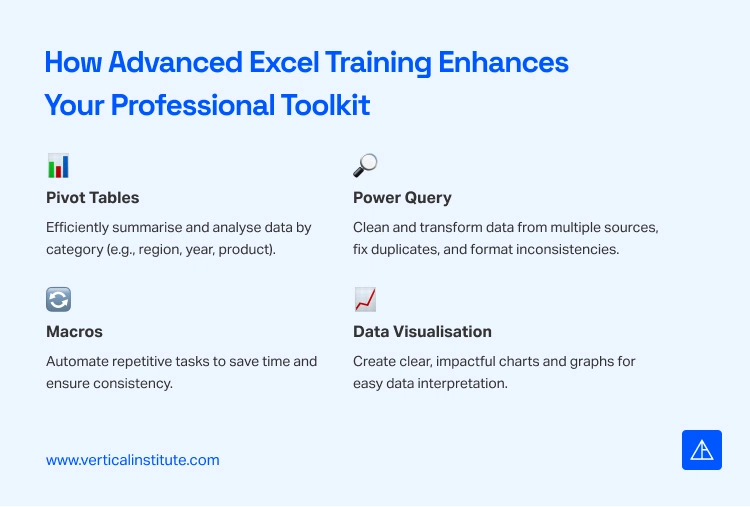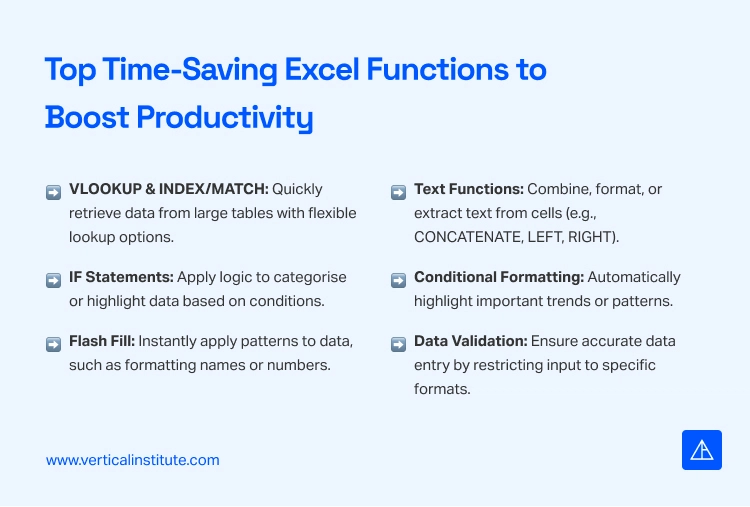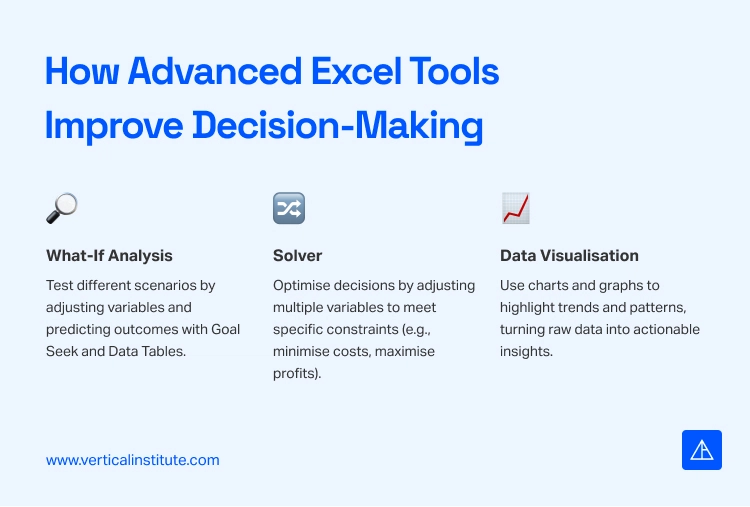How Advanced Excel Training Enhances Your Professional Toolkit
Excel remains one of the most widely used tools globally. Its versatility makes it indispensable across finance, healthcare, logistics, marketing, and education. Excel’s advanced features, such as Pivot Tables, Power Query, and macros, enhance data management, analysis, and visualisation, making it particularly valuable for finance, research, and project management professionals. For professionals at all levels, mastering Excel is crucial for maximising data and driving informed decision-making in today’s workplace.
by Vertical Institute • 20 September 2024 • minutes read
Let’s explore the key objectives of advanced Excel training and how it enhances a professional’s abilities to thrive in data-intensive environments across industries.
Related: How To Get Started in Excel?
How Can Advanced Excel Skills Maximise the Value of Your Data?
Advanced Excel skills unlock the full potential of data by enabling sophisticated analysis and visualisation. Tools like Pivot Tables allow professionals to quickly summarise and dissect large datasets, while Power Query helps transform and clean data from various sources. As noted by Investopedia, these features are critical for businesses to manage big data and make informed decisions based on clean, organised information.

- Pivot Tables
- Summarise, analyse, and compare data efficiently across categories like region, year, or product line.
- Power Query
- Clean and transform data from multiple sources, merging files, removing duplicates, and correcting formatting inconsistencies.
- Clean and transform data from multiple sources, merging files, removing duplicates, and correcting formatting inconsistencies.
- Macros
-
- Automate repetitive tasks like formatting, data entry, or calculations to ensure consistency and save significant time on manual processes.
- Automate repetitive tasks like formatting, data entry, or calculations to ensure consistency and save significant time on manual processes.
- Data Visualisation Tools
-
- Generate charts and graphs to create meaningful visual representations of large datasets for straightforward interpretation and reporting.
For example, a financial analyst working with a large dataset of monthly sales across different regions could use Pivot Tables to compare sales performance by region or year. Power Query would help standardise inconsistent regional reports and correct data errors, saving time and ensuring accuracy. Automating repetitive tasks with macros ensures consistency across datasets and reduces manual work.

Advanced Excel functions can significantly enhance productivity by optimising repetitive tasks, simplifying data management, and improving accuracy. These tools allow professionals to work more efficiently with high-volume data, helping them reduce errors and streamline their workflows. According to PCMag, mastering these functions can turn users into spreadsheet pros, making tasks like data entry, reporting, and analysis much more manageable.
Below are some of the top time-saving Excel functions that can help boost productivity:
- VLOOKUP and INDEX/MATCH
- Efficiently retrieves data from large tables, with INDEX/MATCH offering greater flexibility for complex lookups.
- Text Functions (CONCATENATE, TEXT, LEFT, RIGHT)
- Streamline text manipulation, such as combining or formatting data from different cells.
- IF Statements
- Apply logic to datasets to categorise or highlight important information based on specific conditions.
- Conditional Formatting
- Highlight key data points automatically, making it easier to identify trends or patterns.
- Flash Fill
- Automatically detect and apply data patterns, such as formatting names or numbers across columns.
- Data Validation
- Ensure accurate data entry by restricting input to predefined formats, helping maintain data integrity.
How Do Advanced Excel Tools Improve Your Decision-Making?

Investopedia further highlights that Excel’s advanced tools empower professionals to make data-driven decisions by streamlining complex analyses and enhancing data clarity. These tools allow users to efficiently manage large-scale data and assess various outcomes, making them essential for strategic decision-making.
Here are some key Excel features that support better decision-making:
- What-If Analysis
- This tool enables businesses to explore different scenarios by adjusting key variables and predicting their impact. Goal Seek and Data Tables allow users to determine optimal outcomes and simulate potential scenarios, helping professionals make more informed decisions.
- Solver
- Solver helps professionals optimise decision-making by adjusting multiple variables within specific constraints, such as minimising costs or maximising profits. It’s highly valuable for resource allocation, budgeting, and project management, where it is crucial to find the best solution under given limitations.
- Data Visualisation (Charts & Graphs)
- Data visualisation tools such as charts and graphs make identifying trends and patterns in large datasets easier. By presenting data visually, decision-makers can quickly understand key insights and communicate them effectively. Investopedia emphasises the importance of turning raw data into actionable visuals to make complex information digestible.
How Can Excel Enhance Collaboration and Project Management?
Excel has evolved from a simple spreadsheet tool into a robust platform that supports collaboration and project management, helping teams work more efficiently. Here’s how Excel enhances both:
Shared Workbooks for Real-Time Collaboration
- Simultaneous Editing
- Multiple team members can work on the same file simultaneously, enhancing real-time collaboration.
- Cloud Storage
- With tools like OneDrive and SharePoint, Excel files can be saved to the cloud, allowing team access from any location.
- Reduced Manual Updates
- According to Microsoft, cloud collaboration improves communication and reduces the need for manual file updates, saving time and enhancing team efficiency.
Task and Project Management
- Gantt Charts and Timelines
- Excel allows teams to create visual tools like Gantt charts and timelines to track project progress.
- Task Trackers
- Teams can assign tasks, set deadlines, and monitor project status in a single Excel file.
- Conditional Formatting
- This feature automatically highlights tasks when overdue or approaching deadlines, reducing manual oversight.
- Data Validation
- Project managers can apply data validation to maintain accuracy and ensure that only correct information is entered, improving task management efficiency.
Integration with Other Tools
- Microsoft Project and Power BI
- Excel integrates with project management tools like Microsoft Project and Power BI, allowing data imports from other platforms to create a centralised dashboard for tracking progress and generating reports.
- Cross-Platform Data Import
- Teams can import data from various platforms, streamlining workflows and consolidating information in a single place for easier analysis.
- Enhanced Communication via Teams
- Integration with Microsoft Teams allows users to share live Excel sheets directly within chats, improving real-time collaboration and communication.
Version Control and Change Tracking
- Track Changes Feature
- Excel’s Track Changes allows teams to see who made edits and when ensuring full accountability in collaborative work.
- Transparency in Edits
- This feature provides clarity by documenting all modifications, making tracking changes across different users easier.
- Useful for Large Projects
- In projects where multiple stakeholders are involved, Track Changes ensures transparency, especially when working on the same dataset or report.
Custom Templates for Project Management
- Pre-Built Templates: Excel provides various templates for project management tasks such as budgeting, scheduling, and resource allocation.
- Customisation: Teams can customise these templates to suit their specific project needs, allowing flexibility while maintaining consistency across different projects.
- Consistency Across Projects: Custom templates ensure uniformity in project management, making replicating processes and maintaining project standards easier.
- Versatility: Excel’s template system is highly adaptable and widely used across industries for various project management needs, from finance to construction.
Conclusion
Professionals with advanced Excel skills, such as Financial Analysts and Business Intelligence Specialists, often command higher salaries due to their ability to manage data-intensive tasks. Beyond salary benefits, Excel proficiency opens up opportunities for career advancement, especially in managerial roles that require data-driven decision-making. It is also a versatile skill across various sectors, giving professionals the flexibility to explore broader job opportunities.
Enrol in Vertical Institute’s Data Analytics Bootcamp Today!
Learn advanced Excel techniques essential for success in today’s data-driven industries. With Excel proficiency leading to higher salaries and more job opportunities, this is your chance to grow professionally. Enrol in our Data Analytics Bootcamp and equip yourself with the tools to thrive!